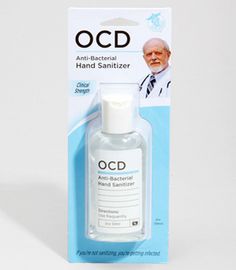I recently wrote about our challenges with Duncan and how I often curse myself for a lack of patience with him, given my own history with OCD. This morning I came across a column from Dr. Keith Ablow that might explain a lot.
Mood music (Still some coding weirdness with the video embedding, but the music works):
<object width=”640″ height=”510″><param name=”movie” value=”http://www.youtube.com/v/MDiF3POJdyU?fs=1&hl=en_US&rel=0″></param><param name=”allowFullScreen” value=”true”></param><param name=”allowscriptaccess” value=”always”></param>[youtube http://www.youtube.com/watch?v=MDiF3POJdyU&fs=1&hl=en_US&rel=0]</object>
Let’s start with a few paragraphs from Ablow’s column:
Obsessive Compulsive Disorder (OCD) and Attention Deficit/Hyperactivity Disorder (ADHD) are very different conditions, according to the Diagnostic and Statistical Manual—the “bible” of psychiatric diagnoses published by the American Psychiatric Association. Yet, my clinical experience tells me they may be linked.
OCD is characterized by unwanted and intrusive thoughts and behaviors. A patient might complain that she “can’t stop thinking” about germs and, therefore, feels compelled to wash her hands dozens of times a day. It is as though the mind or brain is doing senseless laps around a track the person very much wants to stop running.
ADHD is characterized in part by distractibility, forgetfulness and trouble organizing. A patient might complain she “can’t focus” and never seems to finish a task. It is as if the mind cannot stay on course and complete even one lap around the track the person very much wants to run.
Different medicines (in addition to various forms of therapy) are used to treat OCD and ADHD. Obsessions and compulsions seem to yield to medications like Prozac or Effexor that boost serotonin and norepinephrine in the brain. ADHD seems to improve more with stimulants, like Ritalin or Adderall.
But for several of my patients, their obsessions and compulsions seem to have developed as a counterproductive way of “dealing with” preexisting and severe attention deficit problems. Since they couldn’t select what to pay attention to, and since that meant their focus shifted painfully from one thing to another to another, their brains seem to have dropped anchor into rigid, repetitive thought and behaviors (obsessions and compulsions)—so that they began to think or do the same thing again and again and again, in order to stop the very distressing sense of drifting aimlessly.
Naturally, I find myself thinking back to childhood for evidence. I’ve written a lot about my childhood in this blog, including the parts where I believe the seeds of mental disorder were planted.
But it never occurred to me to scour the brain for times when I may have shown some ADHD tendencies.
Looking back, it’s still hard to know for sure.
I certainly had trouble focusing. I was one of the kids who went to a special class for kids who had trouble focusing. I was always daydreaming and staring out the window, but people with OCD do that, too. It’s just that we OCD types have brain-wrenching problems playing over and over in our minds. It’s not about dreams of flying pigs and fluffy clouds. Not that those things go through the mind of someone with ADHD.
I also used to imagine myself in certain scenes from movies and comic books, especially the Superman and Star Wars genres. I wrote about this in a previous post called “Hiding in Movies.” One time, in third grade, I got so carried away that I started to loudly hum the then-new theme to “Star Trek: The Motion Picture,” which had come out that year.
“Who’s humming?” the teacher asked. In unison, half the class answered, “Bill!”
Was that some ADHD working within me? Perhaps. But I’ll never know for sure. The time to determine it was in the 1970s. We obviously can’t go back there.
I always chalked up my elementary school tutors as byproducts of all the school I missed because of the Crohn’s Disease. I needed a lot of help to keep from repeating grades 2, 3 and 4.
Fast forward to 2011, where I’m a parent of two kids. One of them, Duncan, has something going on.
The boy has a heart of gold and a razor-sharp wit, but as I’ve written before, winter messes with his mind as badly as it does mine. He’s always had his quirks, as we all do. Some of them are disruptive enough that we decided to have him evaluated. My family history alone was reason enough to do it.
The meeting in February was fascinating, frustrating, confusing and illuminating all at once.
The doctor asked Erin about her family history, then turned his glare to me. Apparently the paperwork I filled out set off most of the alarm bells in this process. I knew it was coming. I expected it.
He asked about my brother’s death, my childhood illness, the state ofmy parents’ mental health back in the day and how it all shaped the addictive behavior and OCD I would struggle with as an adult. My sister’s struggles also came up.
After that line of questioning, the doctor calmly told us Duncan fit all the textbook criteria of someone with ADHD. He also has some serious trouble with fine motor skills, which helps explain his penmanship.
We’ve long had our suspicions on both counts. But to hear it from a doctor’s mouth was something else.
We talked a lot about how family dynamics could really shape a kid’s struggles and how various mental disorders end up manifesting themselves. My family dynamic growing up took the mental ticks in my head and molded them into something very dark.
The doctor talked about medication. The good news: The stuff they prescribe for ADHD is extremely effective in correcting the brain’s wiring. For a few minutes, I thought that would be the road we were taking.
I wasn’t afraid.
I’ve been on Prozac for four years and know better than most that it works without wiping away my feelings and personality the way I once feared it would. One of our relatives recently worried aloud that medication would kill Duncan’s personality and turn him into something of a robot.
It’s a fair concern, but I know better. I’ve done my homework and used myself as a test case.
But what the doctor said next shattered any idea of medication — for now, at least.
He said that Duncan’s ADHD-like symptoms could also be the very beginnings of something much different — bipolar disorder, depression, maybe even OCD.
ADHD medicines can make those other things much, much worse further down the line.
At this point, we have Duncan seeing a therapist we’re very happy with. Spring is here, so some of his quirks are easing off a bit.
Dr. Ablow’s column doesn’t change the game for us. But it does give us something more to think about.




 The wall hangings are as hit or miss as the T-shirts, but given my love of heavy metal music, I couldn’t help but like this one:
The wall hangings are as hit or miss as the T-shirts, but given my love of heavy metal music, I couldn’t help but like this one:
 No, it doesn’t bother me.
No, it doesn’t bother me.




